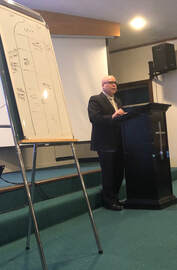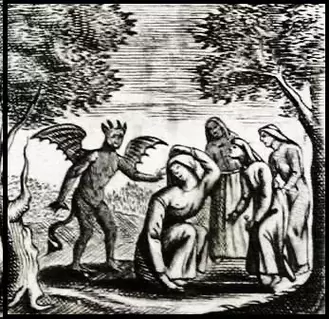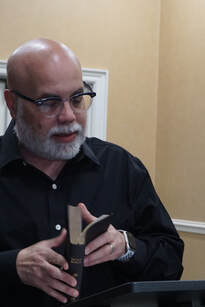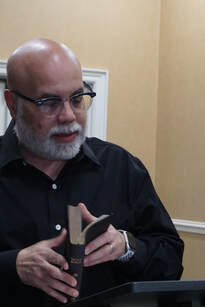|
The Power of Jesus Over Demonic Forces
by: Pastor Miguel Bustillos, Exorcist The Children's Bread Deliverance Ministry Church website :www.deliverancexorcisms.com In the New Testament, the authority and power of Jesus Christ over demonic forces are vividly illustrated through various accounts and teachings. These narratives not only affirm His divine authority but also provide us with assurance of His supremacy over all spiritual adversaries. This blog will explore several biblical examples demonstrating Jesus' power over demonic forces and their implications for believers today. Jesus Confronts and Casts Out Demons One of the most striking examples of Jesus' authority over demonic forces is found in Mark 5:1-20. In this passage, Jesus encounters a man possessed by a legion of demons in the region of the Gerasenes. The man was in a dire state, living among the tombs and unable to be restrained by any means. When Jesus approached, the demons within the man immediately recognized Him and pleaded not to be tormented. “For He had said to him, 'Come out of the man, you unclean spirit!' And Jesus asked him, 'What is your name?' He replied, 'My name is Legion, for we are many.'" (Mark 5:8-9, ESV). Jesus commanded the demons to leave the man, allowing them to enter a herd of pigs, which then rushed into the sea and drowned. This account demonstrates Jesus' absolute authority over demonic forces, as even a multitude of demons were powerless against His command. Healing the Demon-Possessed Boy Another powerful example is found in Mark 9:14-29, where Jesus heals a boy possessed by an unclean spirit that caused him to convulse and foam at the mouth. The disciples had attempted to cast out the demon but were unsuccessful. Jesus, upon learning of the situation, expressed frustration over the lack of faith but then proceeded to cast out the demon. “And Jesus rebuked the unclean spirit, saying to it, 'You mute and deaf spirit, I command you, come out of him and never enter him again.' And after crying out and convulsing him terribly, it came out, and the boy was like a corpse, so that most of them said, 'He is dead.' But Jesus took him by the hand and lifted him up, and he arose." (Mark 9:25-27, ESV). This account highlights not only Jesus' power but also the necessity of faith in dealing with demonic forces. Jesus emphasized the importance of prayer and fasting, indicating that spiritual disciplines are vital in spiritual warfare. The Authority of Jesus' Name The power of Jesus over demonic forces is also imparted to His followers. In Luke 10:17-20, we read about the seventy-two disciples who were sent out by Jesus and returned with joy, saying, "Lord, even the demons are subject to us in your name!" Jesus affirmed their experiences but reminded them of the greater reality of their salvation. "And He said to them, 'I saw Satan fall like lightning from heaven. Behold, I have given you authority to tread on serpents and scorpions, and over all the power of the enemy, and nothing shall hurt you. Nevertheless, do not rejoice in this, that the spirits are subject to you, but rejoice that your names are written in heaven.'" (Luke 10:18-20, ESV). This passage underscores that the authority of Jesus' name extends to His disciples, empowering them to confront and overcome demonic forces. The Victory of the Cross Ultimately, the victory of Jesus over demonic forces is consummated through His death and resurrection. Colossians 2:15 declares: "He disarmed the rulers and authorities and put them to open shame, by triumphing over them in Him." (Colossians 2:15, ESV). Through the cross, Jesus has decisively defeated Satan and his minions, securing eternal victory for all who believe in Him. The biblical accounts of Jesus' encounters with demonic forces reveal His unparalleled authority and power. These narratives not only demonstrate His supremacy but also provide hope and assurance for believers today. We are reminded that through faith in Jesus and the power of His name, we too can stand firm against the forces of darkness. Our victory is rooted in His ultimate triumph on the cross, assuring us that no demonic force can prevail against the power of our Savior. As we reflect on these truths, let us embrace the authority given to us in Christ, engage in spiritual disciplines, and confidently proclaim the power of Jesus over all demonic forces. For in Him, we have the victory.
0 Comments
Death is Just the Beginning: A Christian Perspective on the Afterlife
By Pastor Miguel Bustillos As Christians, we face the concept of death not as an end, but as the beginning of a new, eternal life with Christ. This belief is rooted deeply in Scripture and shapes how we perceive our earthly journey and our transition into eternity. Here, we explore this perspective, supported by biblical references, to offer hope and understanding about what lies beyond our temporal existence. Death as a Transition For Christians, death is merely a transition from the temporal to the eternal, the mortal to the immortal. Paul the Apostle speaks to this in 2 Corinthians 5:1, "For we know that if the earthly tent we live in is destroyed, we have a building from God, an eternal house in heaven, not built by human hands." This passage reassures us that our true home is not of this world but is an eternal dwelling place prepared by God Himself. The Promise of Resurrection Central to Christian hope is the promise of resurrection. Jesus Christ's victory over death through His resurrection is the cornerstone of our faith (1 Corinthians 15:20-22). As Christ was raised from the dead, so too are we promised a resurrection into eternal life. "But Christ has indeed been raised from the dead, the firstfruits of those who have fallen asleep. For since death came through a man, the resurrection of the dead comes also through a man." Eternal Life with God The concept of eternal life is not merely about unending existence but about an unbroken, joyous relationship with God. John 11:25-26 emphasizes this, where Jesus says, "I am the resurrection and the life. The one who believes in me will live, even though they die; and whoever lives by believing in me will never die." This assurance is not just about continuity of life but about the quality of life that is saturated with the divine presence, free from pain, suffering, and grief (Revelation 21:4). The Comfort of Hope In facing death, whether our own or that of loved ones, the promise of what awaits us brings comfort and hope. 1 Thessalonians 4:13-14 encourages believers not to grieve as others do who have no hope, for we believe that Jesus died and rose again, and so we believe that God will bring with Jesus those who have fallen asleep in him. This hope is a profound comfort, knowing that separation by death is temporary and that reunion awaits us. Living with an Eternal Perspective Understanding that death is just the beginning influences how we live our lives today. Colossians 3:2-3 tells us to "Set your minds on things above, not on earthly things. For you have died, and your life is now hidden with Christ in God." This eternal perspective encourages us to live in a way that reflects our future destiny, focusing on the spiritual and eternal rather than the temporal. For Christians, then, death is not a bleak end but a passage to a more glorious reality. It is the door through which we enter an eternal relationship with God, made possible through Jesus Christ. As we live our lives in this world, let us hold fast to this hope, allowing it to guide our actions and comfort us in times of loss, bolstered by the promise of what is to come. 3/25/2024 0 Comments Manifesting God's WayManifesting God's Way: Scriptural Principles for Divine Blessings
In a world where the pursuit of personal desires often dominates, there's a profound longing for fulfillment rooted in divine purpose. Manifestation, a concept gaining widespread attention, holds the promise of realizing aspirations through focused intention and belief. Yet, amidst the clamor of self-centered manifestation techniques, lies a timeless path illuminated by Scripture - manifesting God's way. In this article, we'll explore the spiritual dimension of manifestation through the lens of biblical principles, uncovering truths that lead to the manifestation of God's blessings and purposes in our lives. Understanding Manifestation God's Way: Manifestation, when aligned with God's will, transcends mere wish fulfillment. It involves co-creating with the Divine, allowing His purposes to unfold through our lives. Unlike secular manifestations that prioritize personal desires, manifesting God's way centers on surrendering to His will and aligning our hearts with His divine plan. Scriptural Insights on Manifesting God's Way: 1. Faith Rooted in God's Promises: Hebrews 11:1 declares, "Now faith is confidence in what we hope for and assurance about what we do not see." Manifesting God's way begins with faith grounded in His promises. As we align our desires with His Word, believing in His faithfulness, we open ourselves to His abundant blessings. 2. Seeking God's Will: Matthew 6:10 teaches us to pray, "Your kingdom come, your will be done, on earth as it is in heaven." Manifesting God's way involves prioritizing His kingdom and seeking His will above our own desires. By aligning our intentions with His purposes, we invite His divine intervention into every aspect of our lives. 3. Speaking Life Through God's Word: Proverbs 18:21 reminds us, "The tongue has the power of life and death, and those who love it will eat its fruit." Manifesting God's way entails speaking His truth and promises into existence. By declaring His Word over our lives with faith-filled affirmations, we participate in the manifestation of His blessings and favor. 4. Walking in Obedience and Righteousness: Psalm 37:4 assures us, "Take delight in the Lord, and he will give you the desires of your heart." Manifestation flourishes in hearts surrendered to God's will, delighting in Him and walking in obedience and righteousness. As we align our actions with His principles, we position ourselves to receive His abundant blessings. 5. Trusting in God's Timing: Ecclesiastes 3:11 reminds us, "He has made everything beautiful in its time." Manifesting God's way requires patience and trust in His perfect timing. Even amidst delays and uncertainties, we hold fast to His promises, knowing that He is faithful to bring His plans to fruition in His appointed season. Manifesting God's way transcends the temporal pursuit of personal desires. It's about aligning our hearts with His will, trusting in His promises, and surrendering to His divine timing. As we walk in faith, seeking His kingdom first, speaking forth His truth, and obeying His commands, we unlock the transformative power of manifestation, ushering in His blessings and glory. Let us embrace the path of manifesting God's way, knowing that as we align with His will, He will fulfill the desires of our hearts and bring about His purposes in our lives. For Deliverance Ministry or Exorcism with Exorcist Miguel Bustillos click here: www.cbdmchurch.com Read more on this topic on this blog by Exorcist Bob Larson on understanding how manifesting the wrong way can cause you to get demons: boblarson.org/what-is-the-spirit-of-manifestation/ 3/20/2024 0 Comments The Spirit of PythonBy Pastor Miguel Bustillos, Deliverance Minister, Exorcist
website: www.cbdmchurch.com The manifestation of the Python spirit is characterized by subtle yet suffocating influence, akin to the serpent coiling around its prey. This spiritual entity operates in deception, manipulation, and control, often wrapping itself around individuals, families, or communities to hinder their spiritual growth and freedom. Its manifestations may include: 1. Manipulative Behavior: The Python spirit subtly manipulates situations, relationships, and circumstances to exert control over its victims. 2. Suffocating Influence: Like a constrictor snake, the Python spirit seeks to suffocate and drain the life out of its targets, leaving them spiritually weakened and oppressed. 3. Spirit of Divination: This spirit often operates through divination, occult practices, or false prophecy, seeking to deceive and mislead its victims with counterfeit spiritual experiences. 4. Resistance to Spiritual Authority: Those influenced by the Python spirit may exhibit resistance to genuine spiritual authority, rejecting correction or guidance from God-appointed leaders. 5. Coiling Sensation: Victims of the Python spirit may experience a sensation of being spiritually bound or restricted, as if ensnared by invisible coils. 6. Religious Legalism: The Python spirit thrives on religious legalism and tradition, distorting biblical truths and fostering a rigid, performance-based approach to spirituality. 7. Oppression and Depression: Individuals under the influence of the Python spirit may experience feelings of oppression, heaviness, and depression, as well as persistent struggles in their spiritual walk. Recognizing the manifestations of the Python spirit is crucial for effective spiritual warfare and deliverance ministry. By discerning its tactics and operating in the authority of Christ, believers can break free from its grip and experience true spiritual freedom and empowerment. Buy our book on Amazon: a.co/d/gZs8Zn4 Written by Dr. Rev. Miguel Bustillos
Founder of The Children's Bread Deliverance Ministry website: www.deliverancexorcisms.com Rejection and Inner Healing In the symphony of human experiences, few chords resonate as deeply as the pang of rejection. Whether it stems from personal relationships, professional setbacks, or societal stigmatization, the sting of rejection can pierce the soul and leave scars that linger long after the wounds have healed. Yet, amidst the tumult of rejection, the timeless truths of Scripture offer solace, wisdom, and hope, illuminating a path of healing and redemption for the wounded heart. 1. Acknowledging the Pain: The Bible acknowledges the reality of rejection and its profound impact on individuals. In Psalm 27:10, David cries out, "Though my father and mother forsake me, the Lord will receive me." These words echo the anguish of feeling abandoned and unloved, yet they also affirm the comforting presence of God as the ultimate source of acceptance and belonging. 2. Finding Comfort in God's Love: At the heart of the Christian faith lies the transformative truth of God's unconditional love. In Romans 8:38-39, the apostle Paul declares, "For I am convinced that neither death nor life, neither angels nor demons, neither the present nor the future, nor any powers, neither height nor depth, nor anything else in all creation, will be able to separate us from the love of God that is in Christ Jesus our Lord." In the face of rejection, we can take refuge in the unwavering love of God, which transcends human frailty and offers boundless grace and acceptance. 3. Identifying with Christ's Suffering: The life of Jesus Christ serves as a profound testament to the reality of rejection and the redemptive power of God's love. In Isaiah 53:3, the prophet foretells of the Messiah, saying, "He was despised and rejected by mankind, a man of suffering, and familiar with pain." Through his sacrificial death on the cross, Jesus bore the weight of human rejection and suffering, offering a path of redemption and reconciliation for all who would come to him in faith. 4. Embracing God's Purpose: Even in the midst of rejection, God works all things together for good for those who love him (Romans 8:28). Joseph, in the Old Testament, experienced rejection and betrayal at the hands of his brothers, yet God used these trials to fulfill his divine purpose, ultimately positioning Joseph to save his family and the nation of Egypt from famine. 5. Extending Grace and Forgiveness: As recipients of God's boundless grace and forgiveness, we are called to extend the same to others, even those who have rejected or wronged us. In Matthew 5:44, Jesus instructs his followers to "love your enemies and pray for those who persecute you." Through acts of compassion, forgiveness, and reconciliation, we can break the cycle of rejection and foster healing and restoration in our relationships and communities. Conclusion: In the tapestry of human existence, rejection may weave its threads of pain and sorrow, yet through the transformative power of God's love and grace, we can find healing, redemption, and hope. As we journey through life's valleys of rejection, may we cling to the timeless truths of Scripture, drawing strength from the steadfast love of our Heavenly Father and extending grace and forgiveness to others. In God's embrace, the wounds of rejection are transformed into scars of resilience, testifying to the enduring promise of redemption found in Christ Jesus our Lord. In the pursuit of a spiritually grounded and harmonious home, it's essential to consider the influence of objects within our living spaces. From a biblical perspective, certain items may carry negative energies or associations that can affect the spiritual atmosphere of a home. In this blog post, we'll explore the concept of cursed objects, understand their potential impact, and delve into the biblical principles that guide believers in creating a sacred and consecrated dwelling.
Identifying Cursed Objects: The Bible provides guidance on discerning objects that may carry negative spiritual energy. Deuteronomy 7:25-26 warns against bringing detestable things into our homes, emphasizing the importance of purging such items to avoid being cursed. It's crucial to be discerning about the origin, symbolism, and spiritual history of objects in our living spaces. Scriptural Foundation: Several biblical passages emphasize the significance of consecrating our living spaces to the Lord. Joshua 24:15 underscores the importance of choosing whom we will serve, setting the tone for an intentional and God-centered home. As believers, our homes are meant to be sanctuaries where the presence of God dwells, free from the influence of objects that may compromise spiritual well-being. Practical Steps for Cleansing: 1. Prayer and Repentance: Begin the process with earnest prayer, seeking God's guidance and forgiveness. Repentance is a crucial step, acknowledging any unknowing involvement with objects that may have negative spiritual implications. 2. Discernment through Scripture: Turn to the Bible for discernment. Study relevant passages that provide insights into maintaining a consecrated living space. Psalm 101:3 encourages believers to set no wicked thing before their eyes, emphasizing the importance of guarding what enters our homes. 3. Anointing with Oil: Embrace the biblical practice of anointing the home with consecrated oil. This symbolic act invites the presence of the Holy Spirit, signifying the separation of the home for God's purposes. 4. Removal and Disposal: Identify and remove objects that may have negative spiritual associations. Dispose of them responsibly, ensuring that their influence is completely eradicated from the home. Cultivating a Consecrated Home: Creating a sacred and consecrated home involves more than the removal of cursed objects. It requires a commitment to living in accordance with biblical principles, fostering an environment where prayer, worship, and God's Word are central. Regularly dedicating the home to God and inviting His presence ensures that it remains a haven of spiritual peace and protection. Conclusion: In the light of biblical teachings, the concept of cursed objects prompts believers to assess the spiritual atmosphere of their homes. By aligning with God's Word, practicing discernment, and taking intentional steps to cleanse the living space, believers can create a consecrated environment where the presence of God prevails. May our homes be sanctuaries of peace, love, and divine protection, reflecting the beauty of living in alignment with God's will. "Embracing a Year of Grace: A Christian Guide to Flourishing in the New Year"
As we stand on the threshold of a new year, it's an opportune time for reflection, renewal, and anticipation. For Christians, the turning of the calendar is not just a secular event but a significant moment in our spiritual journey. In this blog post, let's explore ways in which we can encourage and uplift one another as we embark on a fresh chapter in our lives, rooted in faith, hope, and the unwavering grace of our Lord. 1. Reflecting on God's Faithfulness: Take a moment to look back on the year gone by, acknowledging the faithfulness of our Heavenly Father. Despite the challenges and uncertainties, God has been our constant companion, guiding us through the twists and turns of life. Let gratitude be the foundation upon which we step into the new year. 2. Setting Christ-Centered Resolutions: As we make resolutions for the coming year, let's prioritize goals that align with our Christian values. Whether it's deepening our prayer life, committing to regular Scripture study, or extending acts of kindness, let every resolution draw us closer to Christ and reflect His love in our lives. 3. Cultivating a Heart of Compassion: The world is filled with brokenness and pain, and as Christians, we are called to be agents of healing. Let this year be a season of compassion, where we actively seek to share the love of Christ with those around us. Whether through acts of service, kindness, or simply offering a listening ear, let our hearts overflow with the compassion that Christ has shown us. 4. Embracing Unity in the Body of Christ: In a world often marked by division, let Christians stand out as beacons of unity. Let's foster a spirit of love and understanding within our church communities, reaching across differences and celebrating the diversity that makes up the body of Christ. 5. Trusting God's Timing: In the pursuit of our dreams and aspirations, let's trust in God's perfect timing. His plans for us are beyond our comprehension, and as we step into the new year, let's surrender our timelines to His divine schedule, confident that He is working all things together for our good. 6. Nurturing a Spirit of Joy: The joy of the Lord is our strength, and as Christians, we are called to radiate that joy to the world. In the face of challenges, let's choose joy as an act of defiance against despair, knowing that our hope is anchored in the unshakable promises of God. As we embark on this new year, let's do so with hearts full of gratitude, resolutions rooted in Christ, and a commitment to be vessels of His love and grace. May the coming months be a journey of deepening faith, purposeful living, and an unwavering trust in the God who goes before us. Happy New Year, dear brothers and sisters in Christ!
Certainly, the Bible contains various examples and teachings that address the issue of witchcraft, sorcery, and occult practices. Here are a few examples:
1. **Saul and the Witch of Endor (1 Samuel 28):** In this narrative, King Saul, facing imminent battle with the Philistines and abandoned by God, seeks guidance from a medium, the Witch of Endor. Despite the clear prohibition of such practices in the Mosaic Law (Deuteronomy 18:10-12), Saul consults the medium to summon the spirit of the deceased prophet Samuel. This act reflects disobedience to God's commands and leads to tragic consequences for Saul and his sons. 2. **Witchcraft Condemned in the Mosaic Law (Exodus 22:18):** The book of Exodus contains a direct prohibition against witchcraft: "You shall not permit a sorceress to live." This emphasizes the severity with which witchcraft was viewed in the context of ancient Israel. It reflects God's insistence on purity and faithfulness to Him alone. 3. **Paul's Warnings Against Witchcraft (Galatians 5:19-21):** In Paul's letter to the Galatians, he lists various "works of the flesh," including idolatry, sorcery, and witchcraft. He warns that those who practice such things will not inherit the kingdom of God. This underscores the moral and spiritual consequences associated with engaging in occult practices. > "Now the works of the flesh are evident: sexual immorality, impurity, sensuality, idolatry, sorcery, enmity, strife, jealousy, fits of anger, rivalries, dissensions, divisions, envy, drunkenness, orgies, and things like these. I warn you, as I warned you before, that those who do such things will not inherit the kingdom of God." (Galatians 5:19-21, ESV) 4. **Elimination of Sorcery in Ephesus (Acts 19:18-20):** In the city of Ephesus, new believers who had practiced magic arts brought their books and burned them publicly. This symbolic act demonstrated their renunciation of occult practices in response to their newfound faith in Christ. "Also many of those who were now believers came, confessing and divulging their practices. And a number of those who had practiced magic arts brought their books together and burned them in the sight of all. And they counted the value of them and found it came to fifty thousand pieces of silver. So the word of the Lord continued to increase and prevail mightily." (Acts 19:18-20, ESV) These biblical examples highlight the consistent theme of God's prohibition against witchcraft and sorcery, emphasizing the importance of obedience to His commands and the potential spiritual dangers associated with engaging in occult practices. Exploring the Alien-Demon Connection:
Our ministry has delivered many who claimed to have connections with demons. Aliens are demons. If you need deliverance, contact us at www.pastormiguel.com . 4/3/2023 0 Comments What’s in the name of Jesus?The name of Jesus is one of the most powerful and significant names in human history. It carries a weight that cannot be underestimated or ignored. For believers, the name of Jesus represents the ultimate source of hope, salvation, and deliverance. In this blog post, we will explore the power of the name of Jesus and how it can transform our lives.
The name of Jesus is a symbol of authority, identity, and purpose. It is a name that represents the essence of God's character and the nature of His mission. When we call upon the name of Jesus, we are acknowledging His lordship and submitting to His sovereignty. In Philippians 2:9-11, we read that God has exalted Jesus to the highest place and given Him a name that is above every name, so that at the name of Jesus every knee should bow, in heaven and on earth and under the earth, and every tongue confess that Jesus Christ is Lord, to the glory of God the Father. The power of the name of Jesus is not just limited to its ability to save and heal. It is a name that has the power to transform our lives and bring about lasting change. When we call upon the name of Jesus, we are declaring our faith in His ability to change us from the inside out. The Bible tells us that anyone who is in Christ is a new creation; the old has gone, and the new has come (2 Corinthians 5:17). This means that the power of the name of Jesus has the ability to transform our hearts, our minds, and our lives. The name of Jesus is also a weapon against the forces of darkness. The Bible tells us that we do not wrestle against flesh and blood, but against the rulers, against the authorities, against the cosmic powers over this present darkness, against the spiritual forces of evil in the heavenly places (Ephesians 6:12). When we call upon the name of Jesus, we are invoking His authority and power over these forces. We are declaring that the battle belongs to the Lord, and He has already won the victory. In conclusion, the name of Jesus is a powerful and significant name that represents the essence of God's character and the nature of His mission. It has the power to transform our lives, save us from sin and death, and give us victory over the forces of darkness. As believers, we have been given the privilege and responsibility of calling upon the name of Jesus and declaring His lordship over our lives. May we never forget the power and significance of this name, and may we always use it with reverence and awe. we are a deliverance church: www.pastormiguel.com |
The Author:
Rev. Miguel Bustillos (Born-Again Christian) is currently the Senior Pastor of the Children's Bread Church. He is a graduate of The International School of Exorcism, The Advance Academy of Deliverance and Life Christian University, with an Advanced Degree in Theology. Furthermore, He has studied Demonology from many other institutions, including the International School of the Word (ISOW). In addition, he is also a graduate of the Regina Apostolorum in Rome, where he studied "The Rite of Exorcism and Deliverance". He trained with some of the world's top exorcists. He has freed hundreds of God's Children from demonic attacks and torment, in Jesus' name. Jesus gets all the glory. Rev. Miguel is a well known and highly sought after Exorcist and Deliverance Minister in the Washington DC, Maryland, and Virginia area. He was a guest speaker in 2019's International School of Exorcist convention. He received his ordination from Life Christian University. Before getting into ministry, he worked in the healthcare field for 18 years. He became a professor of healthcare at a university in Arlington Virginia and climbed through the ranks to become Program Director and finally Academic Dean. He left his position as Academic Dean to become a full-time Deliverance Minister. He holds terminal advance degrees in Business and Cardiopulmonary Sciences. Archives
July 2024
CategoriesAll 1 Peter 5:8 3 A.M. Challenge 500 Years Of Reformation 8 Lies About God That Sound Like Truth Abandonement Abortion Abusive Husband Abusive Wife Accountability Achan Adam Addicted To Social Media Adopted Advance Academy Of Deliverance African Ahab Alcoholism Alexander Pagani Alien Alien Deception Aliens Aliens Are Demons Aliens In Nevada Aliens Movie Alter Ego Alter Personalities Alters Am I Demon Possessed? Am I Saved Ancestral Dissociative Disorder Ancestral Sins Ancestral Spirits Ancestral Witchcraft Anchor Ancient Ancient Aliens Ancient Demons Anegsl In Battle Angels Angels Against Demons Angels Versus Demons Annabelle Annabelle Doll Anointed Cross Anointing Anointing Oil Apostle Apostle Miguel Bustillos Archangel MIchael Area 51 Are We In Tribulation Armed And Dangerous Armor Of God Armor Of God Against Demonic Forces Asbury Revival Asmodeus Assurance Of Salvation Astral Projecting Witches Astral Projection Astrology Astro Projecting Attacks Of The Devil Attacks On The Mind Audrey Huff Authority In Jesus' Name Authority Of The Believer Baal Baba Yaga Bad Behavior Bad Thoughts Baptism Baptism And Salvation Baptism In Ministry Bastard Behavior Modification Behavior Of Demons Behemoth Belial Best Christian Tattoos Best Deliverance Minister Best Deliverance Ministers Best Deliverance Ministry Best Exorcism Best Exorcist Best Finance Courses Online Best Halloween Costume Best Way To Kill Myself Bhudhism Bible Bible Museum Bible Reflections Bible Teachers Bible Truths BIBLE VERSES ABOUT FINANCIAL CURSES Biblical Condemnation Of Witchcraft Biblical Deliverance Biblical Deliverance Minister Biblical Living Biblical Perspective On Spiritual Spouses Biblical Prophets Biblical Protection Biblical Provision Stories Biblical Response To Witchcraft Biblical Steps To Inner Healing Biblical Teaching Biblical Teachings On Prophets Bishop Bitterness Blaspheming The Holy Spirit Blasphemous Thoughts Blessed Oil Blessing Blessings Blog Blood Curses Bloodline Blood Line Bloodline Curse Blood Line Curses Bloodline Curses Blood Sacrifice Bob Larson Bob Larson Books Bob Larson In Maryland Bob Larson Live Bob Larson Ministries Bob Larson Ministry Bob Larson YouTube Body Body Art Body Soul And Spirit Body Soul And Spirit Explained Body Soul And Spirit Simple Explanation Book Of Acts Born Again Born Again Christian Born Out Of Wedlock Break Free From Bondage Breaking A Curse Breaking A Spell Breaking Blood Sacrifices Breaking Curses Breaking Curses Of Failure Breaking Curses Of Money Breaking Financial Curses Breaking Free Breaking Freemansory Curses Breaking Freemasonry Curses Breaking Generational Curses Breaking Silver Cords Breaking Spells Breaking Spiritual Strongholds Breaking The Curses Of Finances Breaking The Financial Curse Breaking Witchcraft Breaking Witchraft Breaking Word Curses Brett Kavanaugh Broken Heart Broken Hearted Brother Carlos Oliveira Burning Man Festival Can A Christian Have A Demon Can A Christian Have Demons? Cancelling Curses Cancer Can Demons Cause Sickness Card Reading Cars CASH Casting Demons Out Casting Demons Out Of Children Casting Our Demons Casting Out Demons Casting Out Demons Casting Out Demons 2020 Casting Out Demons From Children Casting Out Demons Out Of Children Casting Out Demons Through Zoom Casting Out Devils Casting Out Financial Demons Casting Out Jezebel Casting Out Satan Casting Out Snakes Castings Out Demons Of Lust Catholic Church Catholic Deliverance Prayer Catholic Exorcism Catholic Exorcist Catholic Exorcist In DC Catholic Salvation Characteristics Of True Prophets Charlie Charlie CharlieCharlieChallenge Chastisement Chi Child Baptism Children Acting Up Children's Bad Behavior Childrens Bread Ministry Children's Deliverance Childrens Deliverance Childrens Deliverance Minister Children's Deliverance Ministry Childrens Deliverance Ministry Children's Deliverance Ministry In Maryland Children's Deliverance Ministry In Virginia Chinese Virus Choking Choking At Night Chris Lasala Christ And The Church Christian Christian Counseling Christian Counselor Christian Cousneling Christian Deliverance Christian Deliverance Maryland Christian Deliverance Minister Christian Deliverance Ministries Christian Discernement Christian Discernment Technology Christian Exorcism Christian Exorcist Christian Faith Stories Christian Financial Support Christianity Christian Life Christian Living Christian Ministry Christian Perspective On Witchcraft Christian Reflection Christian Salvation Christians Can't Have Demons Christian Symbols Of Tattoos Christian Teaching Christ Jesus Church Church Deliverance Training Churches Church Fathers Church Team Training Church Training Cleansing The Bloodline Clearing Of The Mind Clerical Shirt Codex Vaticanus Columbia S.C. Combating Seduction Confederate Flag Confederate Monuments Confusion Conjuring Coronavirus Corona Virus Coronavirus Demon Corona Virus In China Coronavirus Outbreak Corso Sull' Esorcismo E Preghiera Di Liberazione Cory Booker Counseling Course On Exorcism Courts Of Heaven Coven Attack Covid19 Covid-19 Covid-19 Vaccines Crash UFO Cross Cured For Coronavirus Curse Curse Breaking Cursed Cursed Money Cursed Object Cursed Objects Curse Of Mammon Curse Of The Bastard Curses Curses Of Trauma Curses On Children Cursing Someone Cutting Dagon Dallas Daniel Daniel 10 Daniel 4 Darkness And Light Cannot Dwell Together Dead Relatives Dealing With Covid-19 Dealing With Curses Dealing With Demons Dealing With Devils Dealing With Evil Spirits Dealing With Family Issues Dealing With Infirmity Dealing With Jezebel Dealing With Mammon Dealing With Pain Dealing With Satan Dealing With Sicknesses Dealing With Sin Dealing With The Devil Dealing With The Loss Of A Loved One Dealing With The Sick Dealing With The Spirits Causing Corona Virus Dealing With Vampires Dealing With Warlocks Dealing With Witchcraft Dealing With Witches Dealing With Witch In The Family Death Deep Pain Defeating Satan Defense Against Witches Deliverance Deliverance And Discernment Deliverance And Healing Ministries Deliverance And Inner Healing Deliverance Church Deliverance Churches Deliverance Church In Maryland Deliverance Church Near Me Deliverance Conference Deliverance For Children Deliverance From Covid-19 Deliverance From Evil Deliverance From Home Deliverance From Infirmity Deliverance From Witchcraft Deliverance In Canada Deliverance In Miami Florida Deliverance In South Carolina Deliverance In The UK Deliverance Meaning Deliverance Miniistry Deliverance Mininstry Deliverance Minister Deliverance Minister For Children Deliverance Minister In Australia Deliverance Minister In Europe Deliverance Minister In Japan Deliverance Minister In Maryland Deliverance Minister In Spain Deliverance Minister In The Philippines Deliverance Minister In The UK Deliverance Minister In The United States Of America Deliverance Minister In Virginia Deliverance Minister Near Me Deliverance Ministers Deliverance Ministries Deliverance Ministries Near Me Deliverance Ministry Deliverance Ministry Basic Training Deliverance Ministry Blog Deliverance Ministry Book Deliverance Ministry Church Deliverance Ministry For Children Deliverance Ministry For Me For Children Deliverance Ministry Guide Deliverance Ministry In Alabama Deliverance Ministry In Asia Deliverance Ministry In Australia Deliverance Ministry In California Deliverance Ministry In Canada Deliverance Ministry In China Deliverance Ministry In DC Deliverance Ministry In DC Area Deliverance Ministry In Florida Deliverance Ministry In Georgia Deliverance Ministry In Germany Deliverance Ministry In India Deliverance Ministry In Israel Deliverance Ministry In Malaysia Deliverance Ministry In Maryland Deliverance Ministry In MD Deliverance Ministry In Netherlands Deliverance Ministry In Philippines Deliverance Ministry In Rockville Maryland Deliverance Ministry In Romania Deliverance Ministry In Singapore Deliverance Ministry In South Africa Deliverance Ministry In Texas Deliverance Ministry In The UK Deliverance Ministry In The United Kingdom Deliverance Ministry In The United States Of America Deliverance Ministry In The USA Deliverance Ministry In UK Deliverance Ministry In Virginia Deliverance Ministry Is Maryland Deliverance Ministry Near Me Deliverance Ministry Prayer Deliverance Ministry School Deliverance Ministry School In UK Deliverance Ministry Tips Deliverance Ministry Training Deliverance Minster In Maryland Deliverance Pastor Deliverance Prayer Deliverance Prayers Deliverance Revival Deliverance Seminar Deliverance Seminars Deliverance Sermon Deliverance Spiritual Warfare Training Deliverance Testimonies And Stories Deliverance Training Deliverancexorcisms.com Demi Lovato Demon Demon Attacking The Mind Demon Attacks Demon Free In 2020 Demon House Demonic Assignments Demonic Attacks Demonic Attack Vulnerability Demonic Bondage Demonic Doll Demonic Influence Demonic Legal Rights Demonic Nightmares Demonic Obsession Demonic Oppression Demonic Possession Demonic Spouse Demonic Strongholds Demonic Thoughts Demonic Tongues Demonic Torment Demonic Transformation Demonization Demon Of Lust Demonologist Demonology Demon Orgasm Demon Patterns Demon Possession Demon Ranking Demons Demons And Being Born Again Demons And Money Demons Are Attacking Me Demons Are Moving In My Body Demons Are Raping Me Demons Are Tormenting Me Demons Attacking My Child Demons Attacking My Family Demons Attacking The Soul Demons Choking Me Demons Come To Me At Night Demons Following Me Demons Hate The Name Of Jesus Demons Have Sex With Me Demons In DC Demons In My Building Demons In My Dream Demons In My Dreams Demons In My Home Demons In My House Demons In My Mind Demons In My Neighborhood Demons In Tampa Florida Demons In The House Demon Slayer Demon Slayer Podcast Demon Slayers Demons Manifesting Demons Moving In My Body Demons On Children Demon Spirits Demons Rape Me Demons Raping Me Demons Sex Demons Speaking To Me Demons Taking My Money Demons Tattoo Demons Torment Me Demons Trying To Kill Me Demons When I Sleep Demons Wrapped Around My Neck Demon Tattoos Depress Depression Derek Prince Destroying A Witch Destroying Curses Destroying Fear Destroying The Kingdom Of Darkness Destroying Witchcraft Spells Devil Devils DID Difficult Demons Digital Media And Occult Discernment In Christianity Disobedience Disobedient Kids Dissociation Dissociative Identity Disorder Divination Divine Provision Divine Purpose Divorce Do Angels Protect Us Do I Have A Demon? Do I Have Demons Do I Have Demons Do I Have Demons? Double Minded Dr Bob Larson Dr. Bob Larson Dr. Bob Larson In Baltimore Dream Attacks Dream Catcher Dream Catchers Dreaming Of Sex Partners Dr Jerry Mungadze Dr. Richard Gallaghar Druid Druids Dr. Vincent Bauhaus Early Church Bishops Easter Eating In My Dream Eclipse Eclipse 2017 Electronic Witch Electronic Witchcraft Elijah Elves Emergency Deliverance Emotional Healing Emotional Pain End Days Ends Times End Times End Times Demons End Times Revival Energy Spirits English Rite Of Exorcism Enneagram Ephesians Ephesians 6:10-18 Equip Equip Churches Equip Deliverance Ministry Equip Ministries Eternal Perspective Evangelism Evangelist John Ramirez Everlasting Life Evil Children Evil Curses Exorcim Exorcism Exorcism And Prayer Of Liberation Exorcism And Psychology Exorcism Book Exorcism Expert Exorcism For Children Exorcism In Exorcism Exorcism In Maryland Exorcism In Rome Exorcism In The UK Exorcism Ministry Exorcism Of Anneliese Michel Exorcism Of Emily Rose Exorcism Prayers Exorcism Ritual Exorcism School Exorcisms For Children Exorcism Training Exorcist Exorcista En Latino America Exorcista En Sur America Exorcist And Psychology Exorcista Que Habla Espanol Exorcist Bob Larson Exorcist Book Exorcist Case Files Exorcist Convention Exorcist For Children Exorcist For Youth Exorcist In Africa Exorcist In Canada Exorcist In Europe Exorcist In Ireland Exorcist In Maryland Exorcist In My Area Exorcist In Scotland Exorcist In The Philippines Exorcist In The UK Exorcist In The United Kingdom Exorcist In The United States Exorcist In The United States Of America Exorcist In The USA Exorcist In UK Exorcist Miguel Bustillos Exorcist Near Me Exorcist Pastor Exorcist Priest Exorcist Show Exorcist Training Exorcist Training School Exorcist Uniform Experienced Exorcist Exposing The Enemy Failed Exorcism Failure Faith In Deliverance Ministry Faith In God's Provision Faith Journey Faith Over Fear Faith Walk Fallen Angel Fallen Angels False Christian False Prophet False Prophets False Teachers Familiar Spirit Familiar Spirits Familiar Spirits In My Bloodline Family Curse Famous Exorcist Fast And Fury 9 Father Amorth Father Candido Father Gabrielle Amorth Father Gary Thomas Fear Feast Of Trumpets Fighting Off Demons Financial Blessings Financial Curse Financial Curses Financial Help Financial Problems Finding Deliverance Resources Fish Tattoos Florida School Shooter Florida School Shooting Flu Forgiven Forgiveness Forgivessness Fortune Teller Fr Amorth Francis McNutt Frank Hammond Freedom From Demons Freedom Through Jesus Freemason Freemason Curses Freemasonry Freemasons Fr. Luke Clark Fruits Of The Spirit Full Immersion Baptism Galatians Generational Curse Generational Curses Generational Spirits George Floyd Getting Choke By Demons Getting Over Pain Getting Raped By Demons Getting Rid Of Demons In My Home Getting Rid Of Ghost Ghost Ghost Busters Ghost In My Building Ghost In My Home Ghost In My House Ghost In The House Ghost Sex Gifts Of The Spirit Gisele Gisele The Witch Glorification Goals For Next Year God God Meets Our Needs God's Blessings God's Care Snf Provision God's Love God's Miracles For Believers God's Provision God's Provision In Difficult Times God Supplies Gods Will God's Word Gods Word God Will Provide Gold Frankincense Myrrh Gratitude Grey Aliens Grief Guardian Angels Guardians Of God Guarding Against Witchcraft Gutenberg Press Habit Formation Halloween Hanuted House Happy Happy New Year Happy New Year 2018 Happy New Year 2019 Happy New Year 2020 Harry Porter Hate Haunted House Haunting Spirits Having Sex With Demons Having Sex With Ghost Healing Healing And Deliverance Ministry Healing Ministries Healing Ministry Healing Prayer Healing Prayers Healing Quotes Healing The Coronavirus Healing The Sick Healing Through Deliverance Ministry Hearing Voices Heaven He Is Watching Hell Hierarchy Of Demons Hinduism Holy Family Provision Holy Spirit Holy Spirit Led Deliverance Home Cleansing Homosexual Dreams Hopeless Horoscopes House Blessings House Cleasing House Exorcism House Infestation How Do Curses Work How Do I Break A Curse How Do I Know I Am Saved How Long Before Christianity Is Outlawed How To Become An Exorcist How To Break Curses How To Break Spells How To Cast Out Demons How To Cast Out Devils How To Deal With Bad Behavior How To Do An Exorcism How To Fight Witches How To Get God's Blessings How To Kill A Witch How To Kill Myself How To Prevent Demonic Attacks How To Tell If I Have A Demon How To Use The Bible To Fight Satan Human Sacrifice Hurt I Am Cursed I Am Depressed I Can't I Can't Keep My Money I Can't Pray I Can't Read My Bible Identifying False Prophets Idolatry I Failed I Have Been Cursed I Hear Voices Illness Immorality And Manipulation Incubus Indian Totem I Need An Exorcism I Need An Exorcist Iniquity Inner Healing Inner Healing Church Inner Healing Ministry Inner Healing Ministry In Maryland Inner Healing Prayer Inner Healing Prayer Training Inner Healing Therapy Inner Healing Work Inner Pain Inspired By Faith International School Of Exorcism International School Of Exorcism Convention International Society Of Deliverance Ministers Invicta Ministries Ireland Irish Exorcism Irish Exorcist Isaiah Saldivar Is Deliverance Ministry Biblically ISDM ISE Convention I See Dead People I See Demons Islam It's A Wonderful Life I've Been Cursed James River Church Janathan Edwards Jared C. Wilson Jay Bartlett Jerry Mungadze Jesus Jesus' Authority Over Demons Jesus Breaks Curses JesusChrist Jesus Christ Jesus Christ And Exorcism Jesus Christ The Exorcist Jesus Healing Jesus I Need You Jesus Is The Deliverer Jesus Name Jesus Our Saviour Jesus Saves Jesus The Exorcist Jewish People Jezebel Jezebel In District Of Columbia Jezebel In The Church Jezebel In Your Church Jezebel Spirit John 3:16 John Eckhardt John Lindell John Ramirez Johnson & Johnson John Zalvaris John Zavlaris Jonah Joshua Joy Kanye West Kentucky Colonel Kesha Kill And Destroy King David King James Bible King Saul Kundalini Las Vegas Shooting Laws Legal Rights Legal Rights Of Demons Leviathan Leviathan Shield Leviathan Spirit Liberation From Demonic Influences Lies Of The Devil Lilith Living For Christ Local Deliverance Ministry Love Lucifer Lucifer Curses Lust Magic Magi Gifts To Jesus Mammon Manifesting Manipulative Technology Marina Seren Mark Driscoll Martin Luther Mass Shootings Max Jukes Medicine Man Medicine Woman Meditation Mental Changes In Demonic Possession Mental Illness Merry Christmas Merry Christmas Wishes Mind Control Mindfulness Minister Ministering Spirits Ministry Ministry Near Me Ministry Of Exorcism Ministry Training Miracle Miracles Modern Forms Of Witchcraft Moloch Momo Money Money Problems Monsignor Stephen Rosetti Monster In My Closet Monsters Under My Bed Moral Law Mourning MPD Museum In DC Museum Of Bible Mutilation My Dolls Are Talking My Pastor Is A Witch Napoleon Hill Native American Totem Nebuchadnezzar Need Deliverance Negative Negative Thoughts Negativity Nephilim New Age New Agers New Decade New Life Ministry New Life Sanctuary New Life Sanctuary In Baltimore New Year New Year's Celebrated Nightmare Nightmares Night Paralysis Night Terrors Obedience Obedience To God Obsession Occult Occult Symbols In Media Old Hag Syndrome Old Testament Once Saved Always Saved Online Deliverance Online Deliverance Ministry Online Witchcraft Online Youth Ministry Open Doors To Demons Open Doors To Satan Operating In The Courts Of Heaven Oscars 2020 Ouija Board Out Of The Devil's Cauldron Overcoming Demonic Attacks Overcoming Doubt In Spiritual Warfare Overcoming Lilith Overcoming Lust Overcoming Sin Overcoming Spiritual Oppression Paganism Pain Parkinson Parkland Shooting Parkland Survivors Passover Past Life Past Life Experience Pastor Pastoral Counseling Pastor John Lindell Pastor Mark Driscoll Pastor Miguel Bustillos Pastor Miguel Bustillos On Witchcraft Pastor Vince Baughaus Pat Holliday Paul Paul The Exorcist Pazuzu Peace Penstilence Pentagram Pergamum Perry Stone Personal Growth Personal Values Pestilence Philippians 4:8 Philippines Exorcism Pigs In The Parlor Plagues Pledians Poltergeist Poltergeist In House Pontifical Athenaeum Regina Apostolorum Pornography Addiction Positive People Possessed Possessed Doll Powerful Angels Powerful Exorcist Powerful Prayer To Break Curses - Rent Rooms Colosseum Power Of Jesus Prayer Prayer Against Financial Hardship Prayer Against The Coronavirus Prayer Against Witches Prayer For Deliverance Prayer For Deliverance From The Demon Leviathan Prayer For Protection Against Demons Prayer Life Prayer Line Prayer Line In Maryland Prayers Against Witchcraft Prayers And Supplications Prayers Of Liberation From Demons Prayers To Break Curses Prayers To Rout Out Demons Prayer Strategy Prayer To Break Financial Curses Prayer Warriors Praying Against The Coronavirus Praying Against The Corona Virus Praying For Healing Of The Land Preventing Demonic Attacks Pride Priest Princes Of Hell Problematic Curses Profitless Work Prophecy In The Bible Prophet Prophetic Deliverance Prophetic Deliverance Ministry Prophetic Fulfillment Prophets Of Scriptures Protecting Faith Protection From Witchcraft Attacks Protection From Witches Protestant Minister Proverbs 13:20 Psalm 91 Psychiatrist Psychiatrist That Believe In Possession Psychiatry Psychics Psychologist Psychology Psychology And Deliverance Ministry Purgatory Python Quarantine Queen Jezebel QU Wave Raped By A Demon Raped By A Devil Raped By A Spirit Raped In Dreams Rapture Rapture 2017 Real Christianity Real Deliverance Ministry Real Exorcism Real Exorcisms Real Exorcist Rebecca Brown Rebellion In Children Rebellion In Spiritual Warfare Rebuke The Devil Recognizing Spiritual Attacks Reformation Reformation Day Reformation Day 2017 Reincarnation Rejection Rejection From Father Rejection From Mother Rejection From Parents Relationships Religion Religions Of The World Religious Spirits Remedy For The Coronavirus Removing Hindrances Removing Obstacles Renwick Gallery Repentance Rev Bob Larson Rev. Bob Larson Rev Bob Larson In Baltimore Rev. Darrell Hutchinson Revelation Revelation 12 Revelation 12 Sign Revelations Revival Rev Miguel Bustillos Rev. Miguel Bustillos Rite Of Exorcism Robert Henderson Roman Catholic Roman Collar Running Away From Witchcraft Sacrifice Sad Saint Michael Center In Manila Philippines Saint Michael Center Of Exorcism Saint Michael Church Saint Michael Prayer Saint Michael's Center Saint Michael The Archangel Saint Of The Day Saints Salavation Salavtion Salem Witch Museum Salvation Sanctification Satan Satanic Banks Satanic Ritual Abuse Satan In The End Times Satanist Saved Scary Movie Schizophrenia Schizophrenic School Of Deliverance Ministry School Shooting Schumann Resonance Scriptural Guidance On WItchcraft Scripture Study Sea Emperor Leviathan Seed War Seek His Guidance Seeking Deliverance Help Self Control Self Cutting Self Discipline Self Injury Self Kill Self Mutilation Self-Mutilation Self Rejection Semen When I Wake Up Serpent Serpent Spirits Servant Heart Service To God Setting The Captives Free Sex Sex Addicition Sex In Dreams Sex In My Dreams Sexual Abuse Sexual Dreams Sex With Demons Sex With Devils Sex With Satan Shadow People Shaman Shamanism Shamans Shapeshifting Sickness Side Effects Of Vaccine Sigil Sigil Tattoos Sign Of Jonah Signs And Wonders Signs Of Demonic Possession Signs Of Demonic Presence Signs Of False Prophets Signs Of Possession Silver Cords Simple Christian Tattoos Sin Sins Skulls Skype Deliverance Skype Deliverance Ministry Skype Deliverance Session Skype Exorcism Skype Exorcist Sleep Paralysis Snake Snakes In Dreams Social Media Social Media And Spiritual Deception Social Rejection Sold My Soul To The Devil Solfeggio Sons Of Sceva Sorcery Soul Soul Mate Soul Pain Soul Parts Soul Ties Soul Wound Soul Wounds Speaking Curses Speaking To Dead People Spells Spirit Spirit Guide Spirit Huisband Spirit Husband Spirit Of Lilith Spirit Of Manifestation Spirit Of Pride Spirit Of Sin Spirit Of The Occult Spirit Of Trauma Spirits In My House Spirits Of Illness Spirits Of Infirmity Spirit Spouse Spirits Responsible For Coronavirus Spiritual Spiritual Advice Spiritual Alignment Spiritual Authority Spiritual Battles Spiritual Blog Spiritual Bondage Spiritual Challenges Spiritual Cleansing Spiritual Counseling Spiritual Danger Spiritual Defenses Spiritual Deliverance Spiritual Discernment Spiritual Empowerment Spiritual Encouragement Spiritual Freedom Spiritual Growth Spiritual Growth And Freedom Spiritual Healing Spiritual Health And Freedom Spiritual Husband Spiritual Husbands Spiritual Legal Rights Spiritual Love Spiritual Oppresion Spiritual Oppression Spiritual Protection Spiritual Purity Spiritual Snakes Spiritual Spouse Spiritual Strongholds Spiritual Victory Spiritual War Spiritual Warfare Spiritual Warfare Against Family Spiritual Warfare Blog Spiritual Warfare Book Spiritual Warfare Insights Spiritual Warfare Online Spiritual Warfare Training Spiritual Warrior Spiritual Weapons Spiritual Wife Spirit Wife Split Personality Sprinkling Baptism SRA Stay At Home Steal Stephen Paddock Steps For Spiritual Protection St. Michael Center St. Michael Center For Spiritual Renewal St Michael Center Of Exorcism Stopping Attacks From Demon Stopping Curses Stopping Witchcraft Stopping Witchcraft Attacks Stopping Witches St. Paul Strengthening Faith Against Demons Stripper At Pastor's Conference Strongholds Succubus Suicidal Suicide Summoning Demons Superbowl Super Bowl Support Groups Talking To Demons Tarot Card Tarot Card Reader Tarot Cards Tattoo Tattoos TB Joshua T.B. Joshua-Pastor Teaching The Bible To Children Ted Bundy Territorial Demons Texas Thanksgiving The Advance Academy Of Exorcism The Apostles The Archangels The Bible The Biblical Order Of The Family The Blue Whale Challenge The Burning Man The Chidlren's Bread Deliverance Ministry The Children Bread Deliverance Ministry The Children's Bread Deliverance Ministry The Childrens Bread Deliverance Ministry The Children's Bread Deliverance Ministry In Maryland The Children's Bread Ministry The Childrens Bread Ministry The Christonian Church The Conjuring The Conjuring: The Devil Made Me Do It The Curse Of Illegitimacy The Demon House The Demons Slayers The Devil The Devil And Father Amorth The Devil's Cauldron The Devourer The Exorcist The Exorcist Files The Exorcist's Podcast The Flu Season The Gospel The Great American Eclipse The Lord Of Karma The Mind The Mind Is The Battlefield The Momo Challenge The Museum Of The Bible The Pope's Exorcist THE PRAYER THAT WORKS FINANCIAL MIRACLES The Rapture Therapy The Real Exorcist The Rite The Spirit Of Corona The Spirit Of Jezebel The Spirit Of Lilith The Spirit Of Mammon The Temple Renwick Gallery The Watchers The Worst Demon Things Move Around By Themselves Tithe Tom Brady Tongues Torah Torment Tormented By Demons Tormenting Demons Totem Trained Exorcist Training In Deliverance Mininstry Training In Deliverance Ministry Training In Spiritual Warfare Traits Of Jezebel Transformative Power Of Deliverance Tribulation Trick Or Treat True Christians True Prophet Trump Trust In God's Timing Trust In His Timing Twin Flame UFO Ufo News Uncurable Disease Under A Witchcraft Spell Unforgiveness Unmasking Jezebel Unmasking The Devil Unsaved Christian Vampire Vampires Vegas Massacre Vexes Virgin Mary Virtual Deliverance Session Visiting Me In My Dreams Voices Voices In My Head Voices In My Head' Voodoo Voodoo Chips VooDoo Doll Voodoo Dolls Warlock Warring Angels Washington DC Weapons Of Deliverance Wedlock Well Being Well Known Exorcist Werewolf Werewolves What Are Angels What Are The Tool Of A Deliverance Minister What Does The Bible Say About Financial Curses? What Is A Ghost? What Must I Do To Be Saved? What The Devil Does Not Want You To Know Why Do I Fail Wicker Man Wife How To Treat Your Husband Wisdom Witch Witch Comes To My Room Witchcraft Witchcraft At My Job Witchcraft Attacks Witchcraft Manipulation Witchcraft Protection Prayers Witch Cursed Me Witchdoctor Witches Witches Attacking Me Witches Cast A Spell On Me Witches In My Home Witches In The Church Witches On Halloween Witches On Hallowwen Witch Intimidation Witch Is Casting Spells Against Me Witch Of Endor Witchraft Wizards Word Blessings Word Curse Word Curses Word Of Knowledge Worldwide Deliverance Worldwide Deliverance Ministry Worship Wuhan Yahuah Yahusha Year 2020 Year 2024 Zak Baggan Zoom Deliverance Zoom Deliverance Minister Zoom Deliverance Ministry Zoom Exorcism Zoom Exorcist Zozo Zozo Demon |












 RSS Feed
RSS Feed


